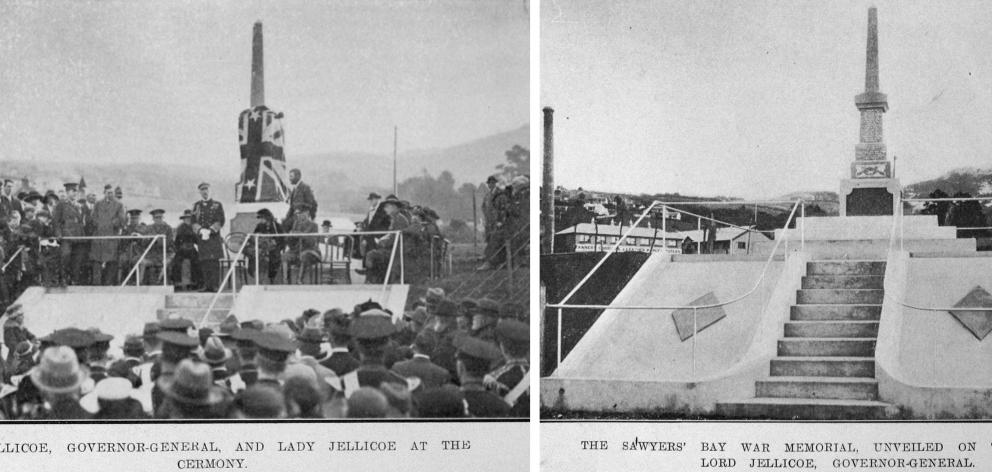
The monument is a miniature granite column on a concrete base.
On it are inscribed 15 names.
Several hundred people were present at the unveiling ceremony, these including visitors from Dunedin and Port Chalmers. Mr J.S. Douglas (Mayor of Dunedin) and Mr J.M. Stevenson (Mayor of Port Chalmers) were amongst the visitors.
Lord Jellicoe, addressing those present, including the girls and boys, said they had all assembled that day to show their appreciation of the gallantry and devotion to duty shown by the residents of that district, whose names were inscribed on the memorial.
“We honour both the living and the dead, and we perpetuate their memories by this memorial,” said his Excellency, who went on to say how fitting it was on such an occasion that many who went from the district to the great war should be present to show appreciation of their comrades.
“For the glory of the Almighty, and in memory of the courage and devotion of the gallant men whose names are inscribed hereon, I unveil this memorial,” said Lord Jellicoe, as he drew aside the flag which veiled the inscription.
After the band had played “Abide With Me”, several appropriate addresses were given by other speakers.
Doubts about extra racing licences
Sporting people throughout the dominion will be greatly interested in the recommendations of the Racing Commission, of whose report the principal features are published by us this morning.
The commission proposes an increase of 27 in the number of days on which the totalisator may be used during the racing season.
Racing clubs will get an increase of nine days; hunt clubs will be reduced by one; and trotting clubs will be increased by 19.
The recognition which the Commission has given to the extension of public interest in trotting is one of the salient points of its report.
Trotting has become highly popular, and as the class of the sport continues to improve, it is becoming increasingly popular.
The existence of a formidable sentiment or predilection in favour of sport must be accepted as a prominent fact.
It constitutes a reflection of a trait in the national character. To it due weight must be given in the formation of any judgement upon the recommendations of the Racing Commission.
The judgement should, however, not ignore the general conditions, and particularly the economic and social conditions, of the country.
It is to disregard the vital requirements of the dominion to propose that no fewer than 27 additional days shall, in existing circumstances, be devoted to racing. A scrutiny of the elements that constitute a race-going crowd is sufficient to show that the loss of industrial energy and industrial efficiency must be very considerable.
When it is plain to all thoughtful persons that it is incumbent upon the public to bend its whole effort to the development of industry and to the encouragement of production, it would be an act of flagrant unwisdom to extend the number of days upon which racing may be licensed.












